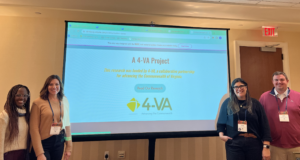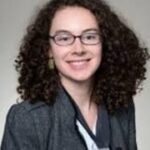
In higher education, “You don’t know what you don’t know” is often the axiom that spurs research to shine a light on a subject not thoroughly illuminated. For Emily Green, music historian and faculty member in George Mason University’s College of Visual and Performing Arts, this maxim served as a motivator to launch a 4-VA@Mason research project titled Music of Early Black Virginians. Green, whose previous research focused on music publishing and marketing in eighteenth- and nineteenth-century western Europe and America, became especially interested in the backstory of this area of music history while teaching Nineteenth-Century African American Music, a graduate course at Mason
Green recognized that much of this important music history needed to be cataloged and made publicly available. “It was a long-standing wish of mine to create a resource for educators to help them understand the variety of genres in Black-American music,” she explained. “K-12 music educators do not always have access to library databases or peer-reviewed journals. I wanted to create an open-access landing point to help teachers navigate the rich resources they can use to learn and quickly enhance their knowledge—and build lesson plans for students of a variety of ages.”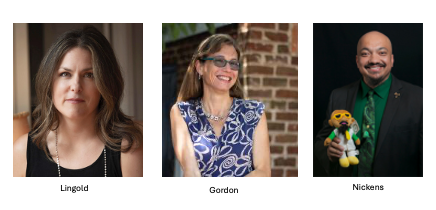 To that end, Green sought the involvement of scholars in the field at several 4-VA partner schools to help her put the project into motion: Mary Caton Lingold at VCU and Bonnie Gordon at UVA. Both readily volunteered their time to bring this multi-level and multi-faceted research to fruition. Michael Nickens (a.k.a. Doc Nix — most recognized as the leader of George Mason University’s “Green Machine,”) also eagerly joined the team. Additionally, Maria Ryan, at Florida State University, came on to collaborate on the project.
To that end, Green sought the involvement of scholars in the field at several 4-VA partner schools to help her put the project into motion: Mary Caton Lingold at VCU and Bonnie Gordon at UVA. Both readily volunteered their time to bring this multi-level and multi-faceted research to fruition. Michael Nickens (a.k.a. Doc Nix — most recognized as the leader of George Mason University’s “Green Machine,”) also eagerly joined the team. Additionally, Maria Ryan, at Florida State University, came on to collaborate on the project.
4-VA funding provided UVA graduate students Laura Carrington OBrion and Sergio Manuel Silva and George Mason undergrads Crystal D. Williams and Jaelin Mitchell the time and space to build a website of nineteenth-century sources that reference Black-American music making: https://masonlibraries.gmu.edu/blackmusic/s/music-black-va/page/home.
From there, the team then published a wide-ranging website Early Black Music in Performance https://earlyblackmusic.4va.gmu.edu/.
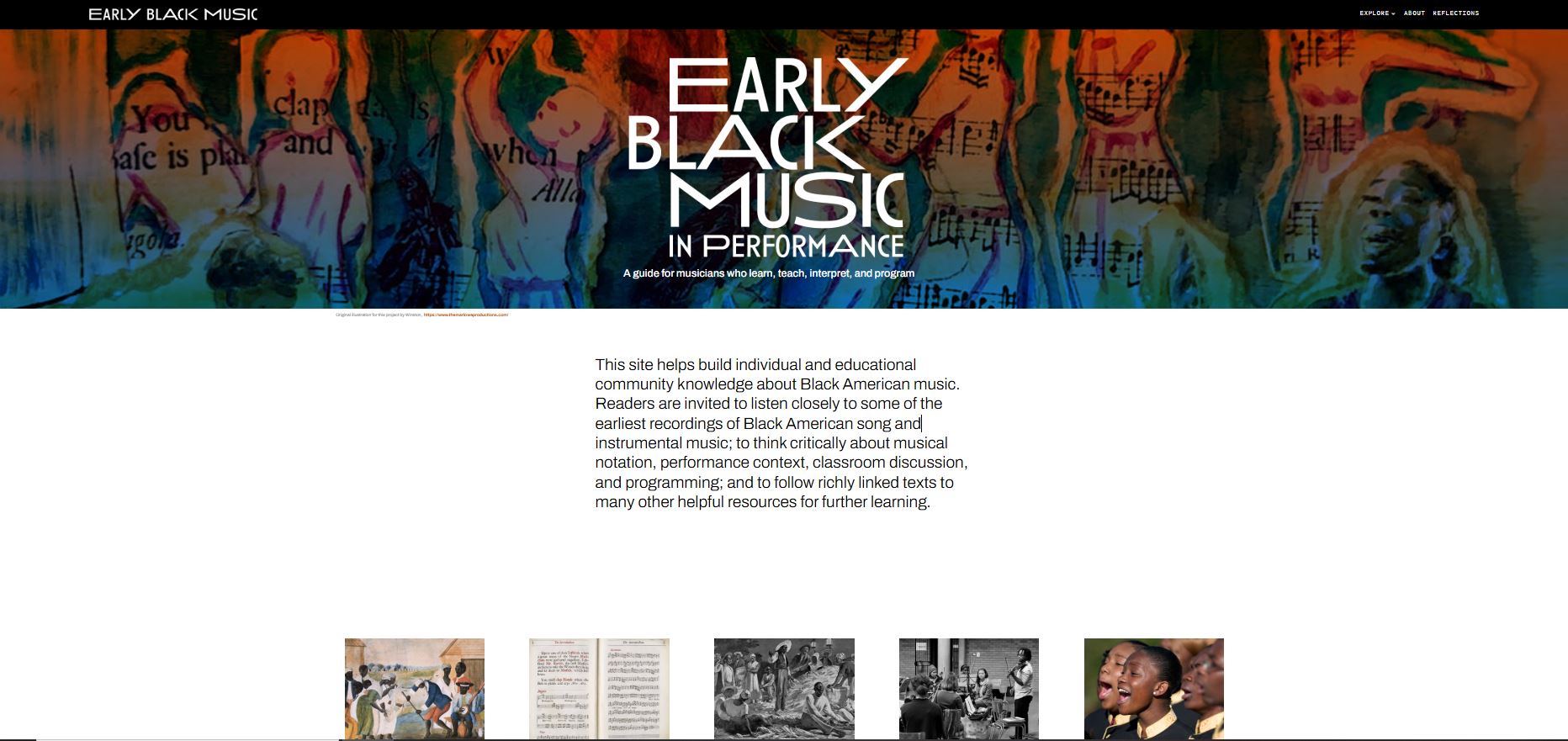
A zoom conference helped introduce and promote the site: Presenters included 4-VA cohort, Kayondra Reid, music educator at Oak Street Elementary School in Falls Church, VA, and Tyler Diaz, Hunter College, NY. Artist Shodekeh Talifero also gave a presentation for the Dewberry School of Music entitled “Breaths along the Potomac.”
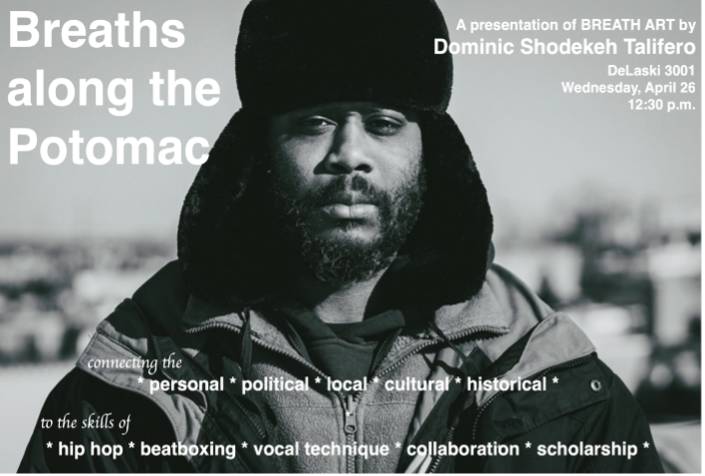
As an added bonus resulting from the effort, Green, Lingold, and Ryan have been contracted to develop a related anthology for Oxford University Press, Sources in Early Black Atlantic Music, which is expected to be published in 2026.
“Most music educators are not taught much about the variety of Black American music in bachelor’s or master’s degrees in our field. Between the database and the web resource, and soon the anthology, our hope is that educators can learn more about reliable print and online resources to use in the future,” says Green.












 This was achieved following 4-VA’s approval of a proposal by George Mason’s Yun Yu, an Assistant Professor in Chemistry and Biochemistry Department, for a grant entitled
This was achieved following 4-VA’s approval of a proposal by George Mason’s Yun Yu, an Assistant Professor in Chemistry and Biochemistry Department, for a grant entitled 

 Angeline Lillard, a widely respected developmental psychologist and researcher in the Department of Psychology at UVA. Explains Doebel, “Our collaboration would not have taken off the way it did if it hadn’t been for Angeline, because she was the one who sent me an email about 4-VA. She said, ‘Have you heard of 4-VA? We should consider this option.’”
Angeline Lillard, a widely respected developmental psychologist and researcher in the Department of Psychology at UVA. Explains Doebel, “Our collaboration would not have taken off the way it did if it hadn’t been for Angeline, because she was the one who sent me an email about 4-VA. She said, ‘Have you heard of 4-VA? We should consider this option.’”


 Led by Myeong Lee, Mason’s Assistant Professor of Information Science and the Director of the Community Informatics Lab, the researchers also included former College of Science faculty members Olga Gkountouna, who assisted with machine learning model development, and Ron Mahabir who provided insight on geographical data analysis. Amr Hilal of Virginia Tech helped with data analytics from a machine learning perspective.
Led by Myeong Lee, Mason’s Assistant Professor of Information Science and the Director of the Community Informatics Lab, the researchers also included former College of Science faculty members Olga Gkountouna, who assisted with machine learning model development, and Ron Mahabir who provided insight on geographical data analysis. Amr Hilal of Virginia Tech helped with data analytics from a machine learning perspective. in their geographical area, it tends to attract more participants. In a second finding, the team implemented three advanced machine learning models to predict the success of local Meetup groups, finding that the performances of these prediction models vary across different categories and cities, with some outperforming the state-of-the-art models.
in their geographical area, it tends to attract more participants. In a second finding, the team implemented three advanced machine learning models to predict the success of local Meetup groups, finding that the performances of these prediction models vary across different categories and cities, with some outperforming the state-of-the-art models.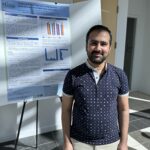 Graduate student Muhammad Umair (left), who gathered and processed fMRI and firing rate data for the research, won first place at the College of Engineering and Computing Innovation Week at Mason with a poster titled ‘Subject and Task Fingerprint using Dynamic Reconstruction from fMRI Time-series Data’.
Graduate student Muhammad Umair (left), who gathered and processed fMRI and firing rate data for the research, won first place at the College of Engineering and Computing Innovation Week at Mason with a poster titled ‘Subject and Task Fingerprint using Dynamic Reconstruction from fMRI Time-series Data’.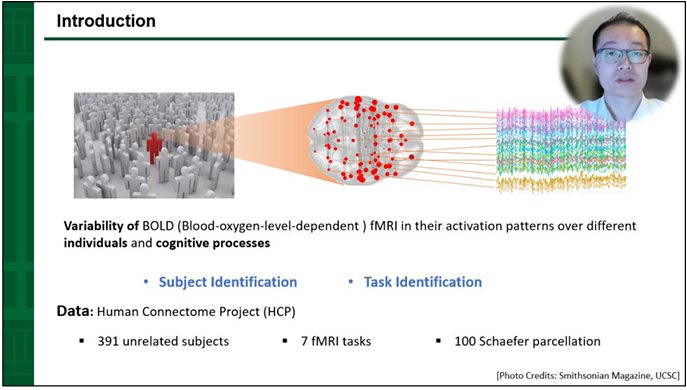

 This dilemma had been on the mind of Margaret Weiss, Associate Professor of Special Education at Mason who has long researched co-teaching and pre-service teacher preparation. She saw an acute need to develop and then test a hybrid professional learning series to prepare general and special education teachers in secondary inclusive classrooms to implement effective co-teaching practices.
This dilemma had been on the mind of Margaret Weiss, Associate Professor of Special Education at Mason who has long researched co-teaching and pre-service teacher preparation. She saw an acute need to develop and then test a hybrid professional learning series to prepare general and special education teachers in secondary inclusive classrooms to implement effective co-teaching practices. Rodgers, an Associate Professor at VCU, would be the perfect collaborator. Rogers specializes in inclusive classrooms, co-teaching, learning disabilities, single-case design methods, collaboration, and classroom observation. As VCU is a partner in the 4-VA network, Weiss was able to invite Rodgers to join her in a 4-VA proposal as a co-principal investigator, which was subsequently greenlighted by the 4-VA@Mason Advisory Board.
Rodgers, an Associate Professor at VCU, would be the perfect collaborator. Rogers specializes in inclusive classrooms, co-teaching, learning disabilities, single-case design methods, collaboration, and classroom observation. As VCU is a partner in the 4-VA network, Weiss was able to invite Rodgers to join her in a 4-VA proposal as a co-principal investigator, which was subsequently greenlighted by the 4-VA@Mason Advisory Board.
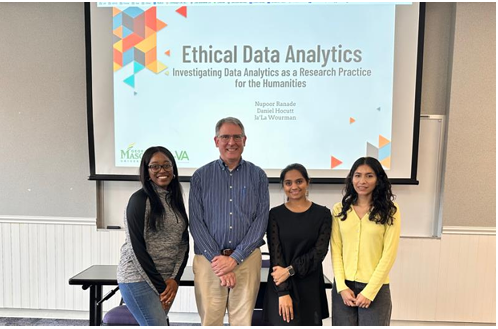

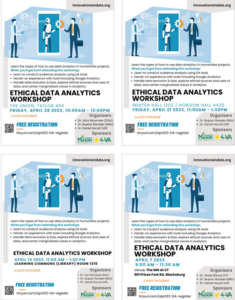


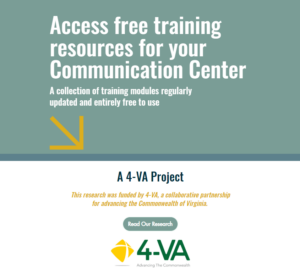 communication center consultants:
communication center consultants: 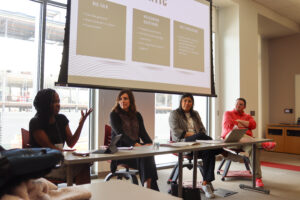 The project and results were presented at the National Association of Communication Centers (NACC) Conference last spring in Blacksburg, Va, and recently at the National Communication Association conference in National Harbor, Md. Broberg reports, “The response was really exciting. Directors from centers all across the country were grateful for the new resources to help training be more consistent and reliable nationwide.”
The project and results were presented at the National Association of Communication Centers (NACC) Conference last spring in Blacksburg, Va, and recently at the National Communication Association conference in National Harbor, Md. Broberg reports, “The response was really exciting. Directors from centers all across the country were grateful for the new resources to help training be more consistent and reliable nationwide.”